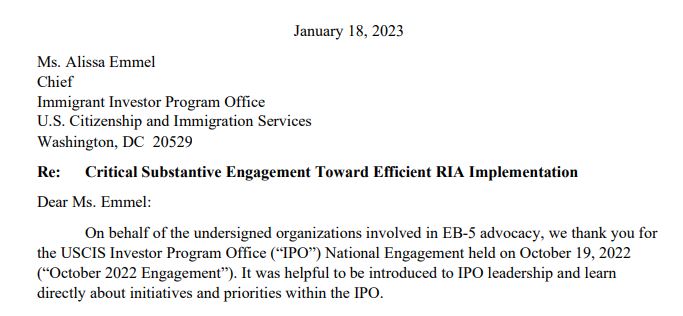On January 18, 2023 Invest in the USA (IIUSA) joined the American Immigration Lawyers Association (AILA), EB-5 Investment Coalition (EB-5IC), and the U.S. Chamber of Commerce in sending a letter to U.S. Citizenship and Immigration Services requesting further substantive engagement to address the effective implementation of the Reform and Integrity Act.
In the letter, the consigners note instances of confusion surrounding components of the RIA and reiterate the industry’s commitment to work with USCIS to avoid these instances moving forward. Further, the signers further noted, “As the recent confusion surrounding the I-956 and I-956G filings by the end of last year showed, substantive engagement between stakeholders and USCIS in the post-RIA world is more critical now than it has ever been.”
At USCIS’s request, the letter also included examples of past interactive IPO engagements with the EB-5 Industry. You can read the complete letter below.
To USCIS
Ms. Alissa Emmel
Chief
Immigrant Investor Program Office
U.S. Citizenship and Immigration Services
Washington, DC 20529
Re: Critical Substantive Engagement Toward Efficient RIA Implementation
Dear Ms. Emmel:
On behalf of the undersigned organizations involved in EB-5 advocacy, we thank you for the USCIS Investor Program Office (“IPO”) National Engagement held on October 19, 2022 (“October 2022 Engagement”). It was helpful to be introduced to IPO leadership and learn directly about initiatives and priorities within the IPO.
An important recurring theme among stakeholders dialing into October 2022 Engagement was the request for a meaningful and substantive engagement with the IPO on implementing the EB-5 Reform and Integrity Act of 2022 (“RIA”). The point of such substantive engagement would be to avoid what the ruling judge in recent litigation against the USCIS deemed a “clearly erroneous” interpretation of the RIA.
When we called into the October 2022 Engagement, we reiterated the point that resolving interpretive questions the RIA raises through litigation, or alternatively, by unilateral agency action, frustrates both the RIA’s purpose and the interests of concerned stakeholders. As the recent confusion surrounding the I-956 and I-956G filings by the end of last year showed, substantive engagement between stakeholders and USCIS in the post-RIA world is more critical now than it has ever been.
The goals of such a dialogue would be to bring awareness about open interpretive questions and to engage in technical discussions examining the different possible interpretations and the impacts they would have on stakeholders. For example, the dialogue could focus on the best interpretation of the RIA regarding sustainment. Leveraging legal and policy experts from both the IPO and the EB-5 industry could bring to bear precedent, prior interpretations of same or similar concepts, prior legislative drafts, current policy, and commercial impacts to together devise the most appropriate interpretation.








